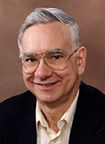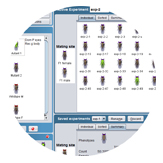 Professor David Pritchard
Professor David Pritchard
Title: Data Mining in 6.002x Informs On-Campus Education
Seminar Date & Time: Thursday, April 18, 2013 @ 2:00 pm
View a movie of Professor Pritchard’s Seminar
During his talk, Professor Pritchard discussed how Massive Open Online Courses (MOOCs) offer a new window for observing student learning behavior. His work examines how the 108,000 participants in the inaugural edX course, 6.002x – Circuits and Electronics, allocated their time amongst the various course components, including reading the textbook, solving homework problems, and viewing TA’s instructional videos, and the fraction of each they accessed. He discussed how student behavior differs when solving homework problems in comparison to exam problems, and that the course format strongly influences reading of the e-text. This work lays the foundation for future studies of how resource use and learning habits influence learning in MOOCs that are highly similar to blended on-campus courses in terms of their course organization and resources.
David E. Pritchard attended Caltech (B.S. 1962) and Harvard (Ph.D. 1968), and has been with Massachusetts Institute of Technology since, where he is now the Cecil and Ida Green Professor of Physics. His research accomplishments span modern atomic physics, including laser spectroscopy, atom-atom and atom-molecule collisions, atomic line broadening, van der Waals molecules, atom optics, atom trapping, precision mass measurement, atom interferometry both without and with Bose Einstein Condensates, and condensed matter physics using ultracold bosons and fermions. Professor Pritchard has a lifelong interest in teaching problem solving and wrote a Mechanics Workbook using the paper-based “programmed instruction” method. He developed cybertutor.mit.edu, then founded Effective Educational Technologies which developed myCyberTutor – now sold by Pearson Education as Mastering Physics, Mastering Chemistry, amongst others. He was the first Major Coordinator in the MIT Physics Department, and won a Dean’s Teaching and Advising Award and the Earll M. Murman Award for Excellence in Undergraduate Advising at MIT (2010). His education research group has developed a new pedagogy for teaching problem solving and an integrated online environment for learning introductory physics. These developments form the basis for the group’s current free online physics course. He is a better mentor than researcher, however; he has mentored four winners of national thesis awards and three Nobel prize winners.



